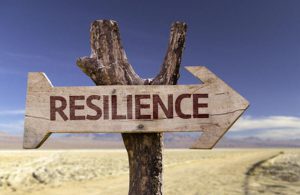The COVID Pandemic has been a source of stress and adversity for adults and youth alike over the last year. Many have seen their lives turned upside down due to loss of a job, change in working conditions, home schooling of children, and in the unfortunate cases of some, the loss of loved ones. For many, this anxiety will continue as their life changes once again on the journey to returning to a post COVID world. It is very important that youth and adults are mentally equipped to deal with this anxiety and adversity.
Three Secrets of Resilient People
 In the TED Talk Three Secrets of Resilient People, Lucy Hone shares how her role of being an expert on resiliency changed to that of a grieving mother after losing her daughter and best friend in a terrible traffic accident. Hones tells her story of learning to live and grieve at the same time by following these three steps.
In the TED Talk Three Secrets of Resilient People, Lucy Hone shares how her role of being an expert on resiliency changed to that of a grieving mother after losing her daughter and best friend in a terrible traffic accident. Hones tells her story of learning to live and grieve at the same time by following these three steps.
Know that suffering doesn’t discriminate.
According to Hones, resilient people understand that suffering is part of life and that everyone has or will experience it. She discusses in this Ted talk that social media as led us to believe that there is a perfect world where people can live with no adversity, but that simply doesn’t exist.
Resilient people are good at choosing where they put their attention.
 Hones reveals that our brains are hardwired to pay attention to the negative that is everywhere in order to protect us. Unfortunately, we are living in a world where threats are a part of our daily lives and our minds are “permanently dialed up” according to Hones. “They typically manage to focus on the things that they can change, and somehow accept the things that they can’t,” Hone said
Hones reveals that our brains are hardwired to pay attention to the negative that is everywhere in order to protect us. Unfortunately, we are living in a world where threats are a part of our daily lives and our minds are “permanently dialed up” according to Hones. “They typically manage to focus on the things that they can change, and somehow accept the things that they can’t,” Hone said
Resilient people ask themselves “Is what I’m doing help me or harming me?”
Hones says this can be therapeutic to anyone who is suffering from grief and adversity One example she used from her on experience was looking through old pictures of her daughter. Hones had to ask herself, is this helping me or hurting and then put the pictures away. This therapeutic activity will help one suffering from grief and adversity by giving them some control of the circumstances. “I won’t pretend,” Hone said, “that thinking this way is easy. And it doesn’t remove all the pain. But if I’ve learned anything over the last five years, it is that thinking this way really does help.”
 This Ted Talk Video not only gives insight into the minds of people who are resilient in times of grief and adversity, the speaker also presents her firsthand experiences of how she used these three strategies to help her grieve while moving forward in her life after facing tragedy.
This Ted Talk Video not only gives insight into the minds of people who are resilient in times of grief and adversity, the speaker also presents her firsthand experiences of how she used these three strategies to help her grieve while moving forward in her life after facing tragedy.
Lucy Hone has dedicated much of her life to resilience research. She earned her master’s in applied positive psychology from the University of Pennsylvania and a Ph.D. in wellbeing science/public health from Auckland University of Technology University. She also participated in research and training of US Military soldiers in resiliency.
 1
1
